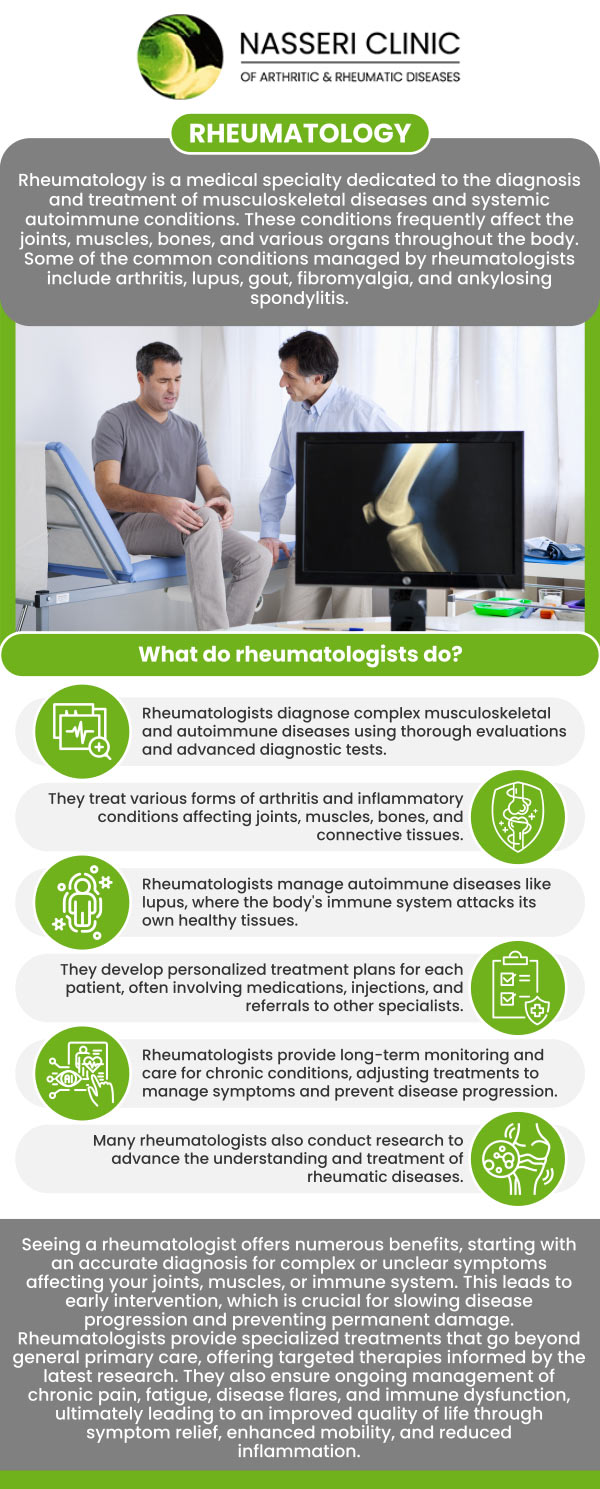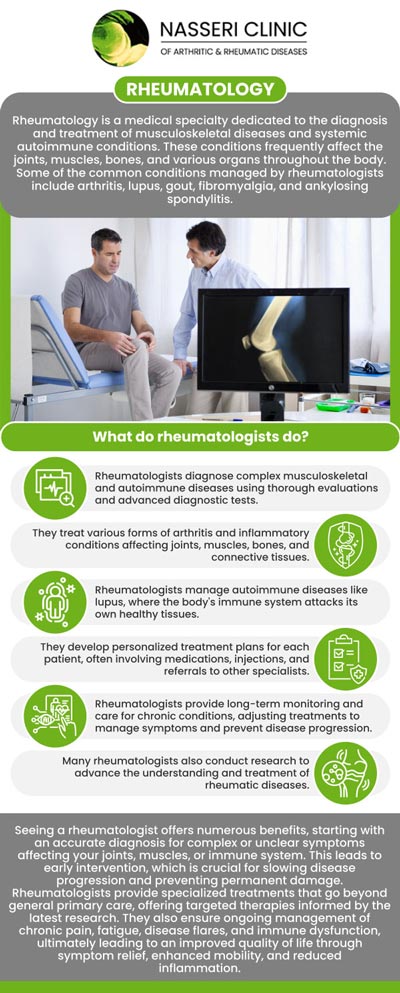What Happens During a Rheumatologist Exam and How to Prepare
The diagnosis and treatment of disorders affecting the bones, muscles, and joints is the specialty of a rheumatologist. For conditions including osteoporosis, lupus, and arthritis, our board-certified rheumatologist, Dr. Nasser Nasseri, MD, and his team offer complete care at Nasseri Clinic of Arthritic & Rheumatic Diseases. For more information, contact us or schedule an appointment online. We have convenient locations to serve you in Catonsville, Glen Burnie, Columbia, North Baltimore, Rosedale, and Edgewater, MD.




Table of Contents:
What do I need to know before seeing a rheumatologist?
What does a rheumatologist do on your first visit?
What does a rheumatologist exam consist of?
What is the major cause of rheumatoid arthritis?
When preparing for a consultation at the Nasseri Clinic of Arthritic and Rheumatologic Diseases, it’s crucial to come equipped with a list of questions that can help you better understand your condition, treatment options, and how to manage your health moving forward. Asking the right questions not only provides clarity about your diagnosis but also empowers you to make informed decisions regarding your care plan. In the following sections, we’ll explore some key questions that will assist you in navigating your consultation effectively, ensuring that you leave the clinic with a clearer path toward managing your rheumatologic condition.
Before your initial consultation with a rheumatologist, it is important to understand that rheumatology is a field specializing in diagnosing and treating autoimmune diseases, musculoskeletal pain disorders, and systemic inflammatory conditions. Preparing for your visit involves gathering any previous medical records, including test results and imaging studies, that pertain to your symptoms or condition. Familiarize yourself with your family’s medical history, as some rheumatologic conditions have genetic components. It’s also helpful to list any medications, supplements, or over-the-counter remedies you’re currently using, as these can influence treatment options. Reflecting on how your symptoms affect your daily life and preparing a timeline of when they first appeared can provide valuable insights for your rheumatologist. This preparation ensures a comprehensive evaluation and aids in the development of a tailored treatment strategy.
On your first visit, a rheumatologist will conduct a thorough review of your medical history and perform a comprehensive physical examination, focusing on your joints, muscles, and skin for any signs of inflammation or abnormality. They will ask detailed questions about your symptoms, such as their onset, duration, and any factors that worsen or alleviate them. Depending on their initial assessment, they might request or review additional diagnostic tests such as blood tests, MRIs, or X-rays to closely examine your condition’s specifics. This visit aims to identify the root cause of your symptoms, differentiate between various rheumatologic conditions, and start formulating a management plan. The rheumatologist will also discuss your concerns and expectations, ensuring you have a clear understanding of the potential diagnosis and the steps ahead.
A rheumatologist examination is a detailed and structured process designed to assess the comprehensive health status of individuals presenting with symptoms suggestive of rheumatic diseases. The exam generally begins with a careful review of the patient’s medical history and a discussion about the nature of their symptoms, including their onset, frequency, and any patterns noted. Following this, there is a physical examination where the doctor meticulously inspects the joints, muscles, and skin for signs of inflammation, swelling, or other abnormalities. Special attention is given to areas of the body that the patient reports as problematic. The rheumatologist may perform specific maneuvers to assess joint mobility, muscle strength, and the presence of tenderness or pain. Additionally, the examination might include checking for signs of systemic involvement, such as rashes or abnormalities in the nails, eyes, or internal organs, which can be indicative of certain rheumatic conditions. Based on the findings from the medical history and physical exam, the rheumatologist might recommend further diagnostic tests, such as blood work or imaging studies, to clarify the diagnosis and inform the treatment plan. This comprehensive approach ensures a thorough evaluation of the patient’s condition, facilitating accurate diagnosis and effective management.
Rheumatoid arthritis (RA) is a chronic autoimmune condition characterized by inflammation and subsequent damage to the joints. Although the exact cause of RA remains unknown, it is believed to result from a complex interplay of genetic, environmental, and immunological factors. Genetically, certain alleles of the human leukocyte antigen (HLA) class II genotypes have been linked to a higher risk of developing RA, suggesting a genetic predisposition to the disease. Environmental aspects, such as smoking, exposure to silica dust, and microbial infections, could trigger the onset of RA in individuals with a genetic vulnerability. The autoimmune response involved in RA is characterized by the immune system mistakenly attacking the synovium, the lining of the membranes that surround the joints, leading to chronic inflammation and joint damage. This process is further complicated by the production of autoantibodies, like rheumatoid factor and anti-citrullinated protein antibodies, which target the body’s tissues, mistaking them for harmful invaders.
Understanding the complexities of rheumatologic diseases requires comprehensive information and open communication with your healthcare provider. Our dedicated team is here to guide you through your diagnosis, treatment options, and management of your condition with the utmost care and expertise. If you have further questions or need clarification on your condition, please don’t hesitate to reach out to us. For personalized advice and support, contact us or book an appointment online. We are committed to helping you achieve the best possible health outcomes and quality of life. We serve patients from Catonsville MD, Glen Burnie MD, Columbia MD, North Baltimore MD, Rosedale MD, Edgewater MD, Hebbville MD, Woodlawn MD, Pasadena MD, Jacobsville MD, Ellicott City MD, Laurel MD, Dundalk MD, Halethorpe MD, Overlea MD, Parkville MD, Riva MD, Annapolis MD, Ferndale MD, and surrounding areas.
Check Out Our 5 Star Reviews


Additional Services You May Need

Additional Services You May Need
▸ Arthritis Care
▸ Infusion Therapy
▸ Lab Services
▸ Radiology
▸ NCARD NRACE
▸ BioFlex Laser Therapy
▸ Ultrasound Guided Injection
▸ NCARD PRP
▸ NCARD Myers
▸ Rheumatology
▸ Myositis
▸ Osteoporosis
▸ Ulcerative Colitis
▸ Multiple Sclerosis
▸ Saphnelo Infusion
▸ Injection Treatments
▸ Intravenous Immunoglobulin Therapy
▸ Asthma
▸ Crohn’s Disease
▸ Fibromyalgia
▸ Infusion Therapy for Gout
▸ Inflammatory Eye Disease
▸ Inflammatory Skin Disease
▸ Vasculitis
▸ Iron Deficiency
▸ Lupus


